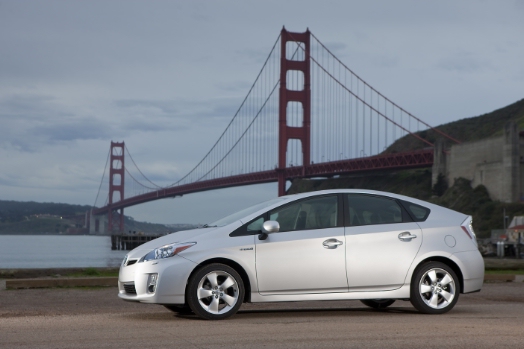- Photo: Toyota
As this working paper by Steven and Alison Sexton explains, there is a substantial, and important, price premium that Toyota Prius buyers are willing to pay to drive a Prius. They are clearly buying something other than mere transportation. To some—indeed many—this waste of resources seems silly. To others it seems wonderful. The comparable gasoline-powered Toyota costs several thousand dollars less. Why would anybody do this? After all, the Prius buyer could purchase the equivalent gas Toyota and use the savings to donate to an environmental organization, or to pay the local boy or girl scouts to pick up litter? Or donate the money to some climate change cause?
For the economist, there is a deeper rationality that generalizes about this type of behavior. And there is a rich and full academic literature in economics that speaks on the topic of commitment via waste, the Prius being just one recent example of that principle in practice. The idea is simple. You and I want a friend or a customer to do a particular thing, yet it’s hard to know what they might do next. If they can pre-commit to a course of action then we might act differently toward them, making us both better off.
Wasting money can do the same thing. Spending money to buy things which are by themselves unproductive or of no value can commit the buyer to a course of action. Once convinced, this will lead others to treat them differently. Economists argue that, other things equal, the more an engagement ring costs, the longer a couple will stay married. Not because the ring cost a lot of money, but instead, the person most deeply committed to the relationship might invest the most in the ring. And, the money wasted on the ring only repays itself if the relationship persists. Therein the waste has rewards. It signals, bonds, and commits, and by doing so gets the spouse to act differently. This explains the custom of why prospective brides are not obliged to return rings to suitors who break off wedding plans or why divorcees are not required, usually, to return rings to their former husbands. If the ring could come back, its expenditure would not have been a waste and of no value.
I have an acquaintance who likes to pay the dinner bill when he goes out with close friends out of respect and love for their relationship. Naturally, the other couple often feels the same way. Occasionally they split the tab, but other times he insists on paying. When he does, the other friends have brandished a $100 bill, torn it into small pieces, and tossed it into the air because they wouldn’t let him pay. Having watched him do this several times, his past behavior of tearing up $100 bills has since convinced them of his earnestness. The past waste has rewarded him as he gets his way.
And this is why Priuses have to look ugly. If they looked like other Toyotas or similar cars, then no one could observe the waste of resources.
A prediction emerges: Hybrids and electric cars will look like regular vehicles once the price of gasoline makes them cost effective. Once there is no waste to buying a hybrid, there need be no signal of the waste, because there isn’t one.
So what is it that Prius owners are getting for the money they waste at the time of the purchase? They are almost instantly recognized as an environmentalist. That can pay dividends in many dimensions. For instance, sales people who want to impress environmentally-sensitive clients who drive a Prius have a leg up. Simply calling yourself an environmentalist is not nearly as effective as driving a Prius and proving that you are. The money wasted at purchase is returned via potentially enhanced sales.
Here are a couple of guesses. People that buy environmentally-certified products such as sustainable lumber or green energy need ways to reveal that behavior to others. The ugliness of the Prius performs that task. Yet there is no similar way for home remodelers to signal that they have bought sustainable lumber or for buyers of green electricity to alert their neighbors, friends, and business customers. The thoughtful enviropreneur will realize this is a profit opportunity. If you can figure out a way for buyers of green energy to let the world know they have spent 20 cents per kilowatt hour on electricity, I predict that a lot more people will buy green electricity. Solar panels on roofs are sometimes visible and help reveal the waste, but only when seen from the street and only then by a small number of people who are important to the buyer. The enviropreneur who finds the answer will make a lot of money, as Toyota has, and also get more power produced from alternative sources of energy.



